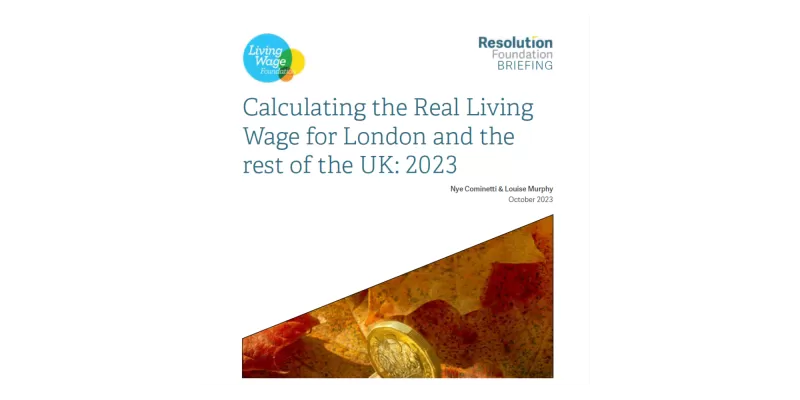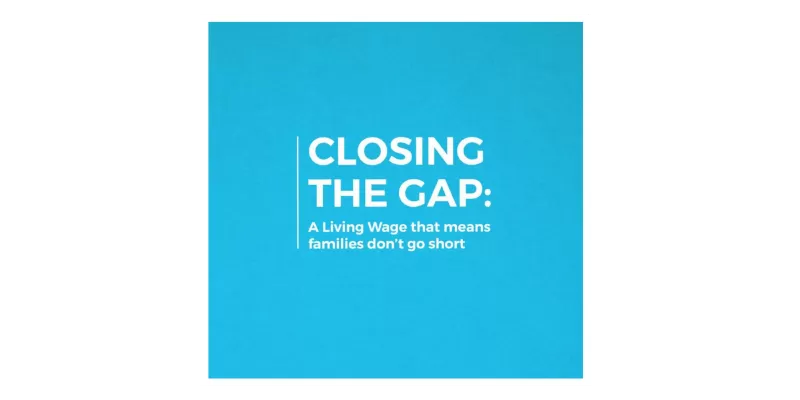The real Living Wage is the only UK wage rate based on living costs.
UK Living Wage
£12
London Living Wage
£13.15
The real Living Wage is the only UK wage rate based on the cost of living. It is voluntarily paid by over 14,000 UK businesses who believe their staff deserve a wage which meets everyday needs - like the weekly shop, or a surprise trip to the dentist.
Over 460,000 employees have received a pay rise as a result of the Living Wage campaign and we enjoy cross-party support. We have a broad range of employers accredited with the Foundation including half of the FTSE 100 and big household names including Nationwide, Google, LUSH, Everton FC and Chelsea FC, as well as thousands of SMEs.
The Living Wage rates for 2023-24 were announced on the 24th October 2023. Employers will then have 6 months until May 1st to implement them.
What is the Government's National Living Wage rate?
As of the 21st November 2023, The Government has announced their new 'National Living Wage' rates for 2024 as £11.44 an hour, and have adjusted this to include 21 year olds and over. This won't come into effect until April 2024, and even when it does come into effect, will still be £1,092 a year short of what a worker on the real Living Wage would earn, and £3,334.5 less than a worker on the London Living Wage. You can find out more about the Government's National Living Wage rates here.
In April 2016 the government introduced a higher minimum wage rate for all staff over 25 years of age inspired by the Living Wage campaign - even calling it the ‘national living wage’.

However, this wage is not calculated according to what employees and their families need to live. Instead, it is based on a target to reach 66% of median earnings by 2024. As of April 1st 2024, the government minimum will be adjusted to include those over 21 years old.
The real Living Wage rates are higher because they are independently-calculated based on what people need to get by. That's why we encourage all employers that can afford to, to ensure their employees earn a wage that meets the costs of living, not just the government minimum.
The calculation
- The UK Living Wage for outside of London is currently £12.00 per hour.
- The London Living Wage is currently £13.15 per hour. This covers all boroughs in Greater London.
- The rates are calculated annually by the Resolution Foundation and overseen by the Living Wage Commission, based on the best available evidence about living standards in London and the UK.
- The basket of goods draws on the Minimum Income Standard to identify everyday living costs through public consensus.
- Before 2016 the London Living Wage was calculated by the Greater London Authority and the UK rate was calculated by the Centre for Research in Social Policy at Loughborough University.
Living Wage Employers should implement the new rates as soon as possible and within six months of the annual announcement in Autumn. For more information please visit our FAQs page
What goes into calculating the real Living Wage?
Watch our explainer animation to understand the process of calculating the real Living Wage.
Resolution Foundation: Real Living Wage Methodology
Find out more about the methodology behind the calculation of the 2023-24 Living Wage rates by the Resolution Foundation.

The Living Wage Commission: A real Living Wage
The Commission was set up in 2016 to oversee the calculation of the independent Living Wage rates in London and the UK. It is a group of leading Living Wage employers. independent experts and representatives from trade unions and civil society.

Minimum Income Standard
We use a public consultation method called MIS to inform the rate. MIS asks groups to identify what people need to be able to afford as a minimum. This is fed into a calculation of what someone needs to earn as a full-time salary, which is then converted to an hourly rate. You can read about the 2023 Minimum Income Standard here.
London Minimum Income Standard
Living costs are much higher in London than in the rest of the UK - that is why the London Living Wage is higher than the UK rate. Our calculation is based on living costs and when it is annually recalulated we take into account any fluctuation in those costs. Rent is the primary living cost that causes the differential between the two rates but we also take into account childcare, travel costs, food and household bills. Read the latest London Minimum Income Standard here.
Past Living Wage rates
| Year | London Living Wage | UK Living Wage | National minimum/National Living Wage | |
|---|---|---|---|---|
| 2003-4 | £6.40 | £4.50 | ||
| 2004-5 | £6.50 | £4.85 | ||
| 2005-6 | £6.70 | £5.05 | ||
| 2006-7 | £7.05 | £5.35 | ||
| 2007-8 | £7.20 | £5.52 | ||
| 2008-9 | £7.45 | £5.73 | ||
| 2009-10 | £7.60 | £5.80 | ||
| 2010-11 | £7.85 | £5.93 | ||
| 2011-12 | £8.30 | £7.20 | £6.08 | |
| 2012-13 | £8.55 | £7.45 | £6.19 | |
| 2013-14 | £8.80 | £7.65 | £6.31 | |
| 2014-15 | £9.15 | £7.85 | £6.50 | |
| 2015-16 | £9.40 | £8.25 | £6.70 | |
| 2016-17 | £9.75 | £8.45 | £7.20 | |
| 2017-18 | £10.20 | £8.75 | £7.50 | |
| 2018-19 | £10.55 | £9.00 | £7.83 | |
| 2019-20 | £10.75 | £9.30 | £8.21 | |
| 2020-21 | £10.85 | £9.50 | £8.72 | |
| 2021-22 | £11.05 | £9.90 | £8.91 | |
| 2022-23 | £11.95 | £10.90 | £9.50 | |
| 2023-24 | £13.15 | £12.00 | £10.42 | |
| 2024- | £13.15 | £12.00 | £11.44 |
